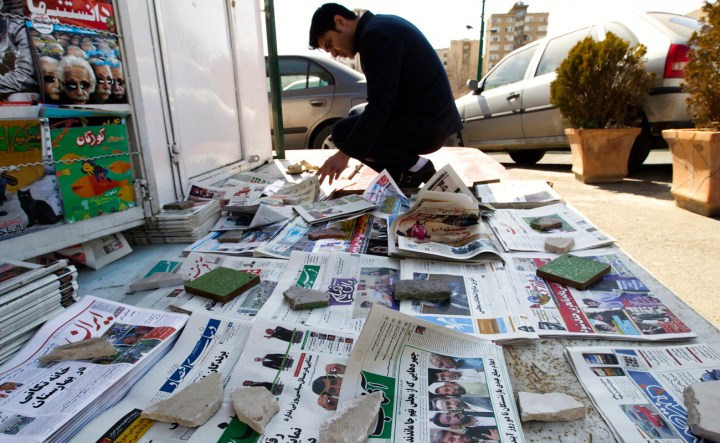Newsdeck
Strange calm in the eye of the Middle East storm

An "interim" agreement in the West's nuclear talks with Iran and the entrance of less hawkish elements into Israel's government offer a rare glimpse of clear skies in the Middle East. However, the promise of peace is burdened by the reality that Tehran's nuclear ambitions are only one facet of its pursuit for regional dominance. By VICTOR KOTSEV.
Earlier this year, amid near-constant war games and sabre-rattling the world was faced with the imminent prospect of war in the Persian Gulf. More recently, as more and more sources report that nuclear talks with Iran are back on track for at least an “interim” agreement, and since a spectacular upset in Israeli politics days ago opened up possibilities, we have had a chance to enjoy a pleasant and rare daydream of peace.
Either scenario may wait awhile – though it is worth noting that this polarisation of options favours war more than peace, in part because it is a certain indicator of volatility, which often leads to violence if left unchecked. A peace process between Israelis and Palestinians is a daunting undertaking; a successful one even more so. Initial steps may be made now, but the bulk of it will likely have to wait at least until the US presidential election in November.
On the other hand, on-going negotiations, if successful, will buy time, but are unlikely to resolve the core issues. As leaks would have it, the bone of contention is the level to which Iran would be allowed to enrich uranium under a deal. However, experts contend that even stopping the enrichment programme altogether may not prevent Iran from advancing its military nuclear programme.
Anthony Cordesman of the Centre for Strategic and International Studies, who published a comprehensive analysis of the vast collection of unclassified International Atomic Energy Association documents on the Iranian nuclear program, last week wrote: “These reports make it clear that simply controlling Iran’s fuel cycle will not stop Iran from improving every other aspect of its nuclear breakout capabilities anymore than attacking its major current enrichment activities will. Neither arms control and inspections that focus on actual enrichment, nor bombing key enrichment facilities, can now stop Iran from moving forward in many important areas.
“Iran has gotten[sic] too far, and its technology base is too large… Iran can cloak each effort as an exercise in pure research or with some civil rationale, or it can disperse the others – often into very small facilities or ones with a convincing academic or industrial cover. It also can make many mobile, and put them in to trailers, truck beds, or palletized and easily separable assemblies – allowing quick cover and dispersal.”
If this analysis is correct, a strike that is too limited or premature would accomplish little more than relying on a deal (assuming one is reached) would. Neither would solve the main problems permanently, but given the economic stability of much of the world may be threatened by a war in the Persian Gulf, waiting a little longer would be the logical thing to do.
There is a major caveat: The Israeli leaders will likely rely on surprise if they decide to launch a strike, and the most propitious moment may well present itself at a time when attacking is not the most logical thing to do. Also, some analysts speculate that, given the rocky relationship between US President Barack Obama and Israeli Prime Minister Benjamin Netanyahu, the latter might launch a strike at a sensitive moment for the American president. Such action would be based on the expectation that a sharp rise in the price of oil would topple Obama, and could only happen, hypothetically should Netanyahu calculate that Obama’s opponent has a good winning chance.
These calculations were shaken up, but not overturned, by the dizzying political pirouette Netanyahu performed in Jerusalem in the past couple of weeks. Firstly, he called an early election, a year ahead of schedule, over several difficult but relatively tangential domestic issues (such as drafting ultra-Orthodox Jews into the Israeli army). Then, in the middle of the night, just as the Knesset was debating a bill to dissolve itself, Netanyahu interrupted the session to announce that he had just struck a unity deal with the main opposition party, Kadima.
Arguably, the opinion polls which showed Kadima would lose more than half of its current seats in parliament in an early election helped persuade its recently elected leader, Shaul Mofaz, to go back on recent promises and to join Netanyahu’s government.
There are several ways to interpret these developments. Some commentators crowned Netanyahu “king of Israeli politics”, others claimed Israeli voters were far more volatile than the polls show and that he acted out of weakness, but the bottom line is that the new coalition controls over 75% of the parliament’s seats. Moreover, Netanyahu is now in a position to balance between partners on his right and partners on his left, and thus attempt reforms and initiatives that until now seemed almost unthinkable.
There is plenty to reform. The electoral regulations, for example, set a relatively low threshold for a party to enter the Knesset, which has resulted in a long string of weak governments made up of diverse coalitions that could not push through controversial legislation. As George Friedman, the founder of the US-based intelligence analysis organisation, Stratfor, put it, “An Israeli prime minister spends most of his time avoiding dealing with important issues, since his cabinet would fall apart if he did.”
Not surprisingly, changing the system of governance is one of the professed four top priorities of the unprecedented new coalition. The other three are tweaking the model of conscription, passing a “responsible” budget, and the peace process with the Palestinians.
Within days, the Israeli government made several impressive steps toward resuming the peace process, including a deal to end the hunger strike of over 1,500 Palestinian prisoners, the symbolic transfer of the bodies of 100 Palestinian militants to the Palestinian Authority and a meeting between Netanyahu’s special envoy and Palestinian President Mahmoud Abbas.
Still, it is too early to say whether this is a sign of anything bigger or if it will remain as a token gesture to Mofaz (who is a steadfast proponent of negotiations and proposed his own peace plan back in 2009).
Besides, several challenges loom on the horizon, including Palestinian demonstrations commemorating the wars of 1948 and 1967. Last year, demonstrators from Syria and Lebanon attempted to run the Israeli border resulting in dozens dying in clashes that followed, and hundreds being injured.
In general, many see Mofaz as a moderating factor in the Israeli government. As the prominent Canadian-Israeli academic and intellectual, Bernard Avishai put it, “I do not see Mofaz giving the strident side of Netanyahu a blank check. I see him giving the cautious and globalist side of Netanyahu support that he couldn’t get from other parties in his coalition.”
This assessment applies to domestic issues, the peace process with the Palestinians and the Iran crisis. Iran, though not mentioned as one of the top four coalition priorities, is the proverbial elephant in the room.
It bears noting that Mofaz, a former chief of staff in the Israeli army who was born in Tehran, brings a unique perspective and set of skills into the Israeli security cabinet (a key body on security decisions). According to most estimates, Mofaz will not rush into a decision to attack Iran’s nuclear programme, but his presence would add credibility to the Israeli threats.
Should the Israelis choose to attack, the presence of Mofaz, the third former chief of staff in the nine-strong security cabinet, would shield Netanyahu from potential criticism to an extent. It would also give him additional ammunition to counter the so-called “spy revolt”.
For the time being, a focus on sweeping domestic reforms could prove to be not only an ideal holding action for the Israelis, but also a way for them to make use of an exceedingly rare opportunity. It could also help Netanyahu cement his grip on power, which is hardly a chance a politician would miss.
We may call it a temporary policy of isolationism on the part of Israel, interspersed perhaps with symbolic exchanges of gestures with the Palestinians. This scenario is not assured, but in the context of the American presidential election, the world economic crisis, and the Arab Spring, it would make a lot of sense.
Credit: This edited article is used courtesy of Asia Times Online.
Photo: EDITORS’ NOTE: Reuters and other foreign media are subject to Iranian restrictions on leaving the office to report, film or take pictures in Tehran.
A man looks at newspapers at a news stand in Tehran March 4, 2012. Hardliners allied with Iran’s Supreme Leader Ayatollah Ali Khamenei maintained their lead in the country’s parliamentary vote, with partial results on Sunday showing supporters of the president trailing behind. REUTERS/Raheb Homavandi.




















 Become an Insider
Become an Insider